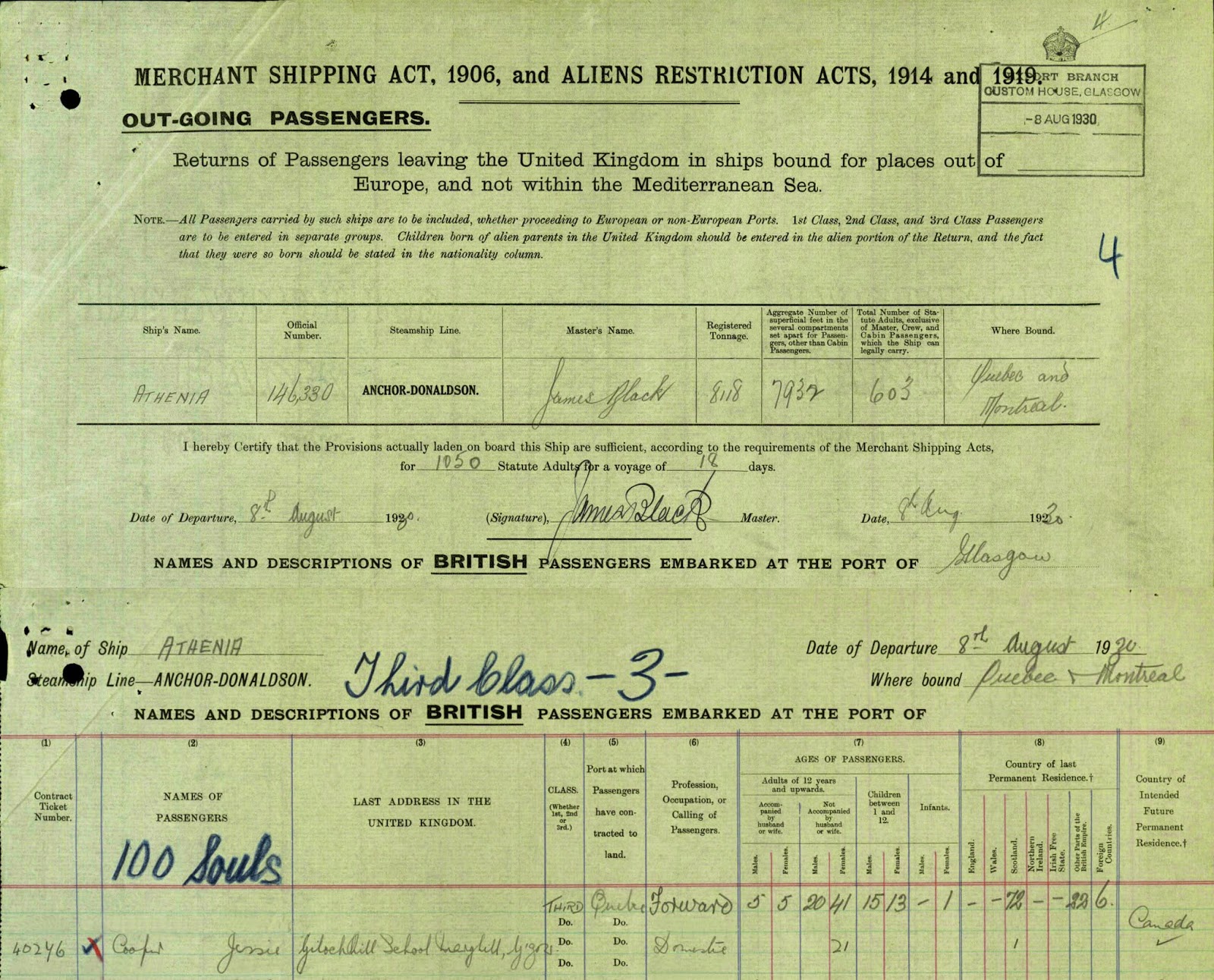In
my last two posts I gave information about how my grandfather and
great-grandfather arrived in Canada. Other family members also came by ship,
some of which vessels had interesting histories themselves. In the next two
posts I will describe the passage of my wife, Linda’s uncles and parents to
Canada.
|
Name
|
Relationship to Linda
|
Ship
|
Date
Departed
Date
Arrived
|
Departure
Port
Arrival
Port
|
|
John
Walker Cooper
|
Uncle
|
SS Athenia
|
17
September 1926
26
September 1926
|
Glasgow
Quebec
& Montreal
|
|
Jessie Walker Cooper
|
Mother
|
SS Athenia
|
8
August 1930
17
August 1930
|
Glasgow
Quebec
|
The first to arrive was John Walker Cooper, Linda’s mother’s brother, aboard the SS Athenia, in 1926. John, or “Jackie” as he was known, was one of the Cossar boys, who were relocated to a farm near Gagetown, New Bruswick from Scotland, by Dr. George Carter Cossar, as part of a plan to give them a better life and a more hopeful future. I wrote about Jackie and the Cossar program in an article in Canadian Stories, An Anthology of British Home Child Stories, published in 2012 (Janzen, Ed & Susan, Editors).
Part
of the article described their new home: “Cossar Farm or the Cossar Farm, Receiving Home and Distributing
Centre for Scotch Lads, as it was officially called, was one of many such
establishments set up to house and “train” over 100,000 child immigrants sent
to Canada as ‘Home Children’ between 1869 and 1939 (Kohli, 2003). Over the
years the farm operated, some boys came voluntarily, looking for a better
life. Others were sent there as
punishment for bad behaviour at home.”
John
made the trip with other boys of similar age, as shown on the passenger
manifest. Five were listed on the outgoing list, with the last address in
Scotland shown as c/o Doctor Cossar, 23 Monteith Row, Glasgow. Only four are
shown on the incoming record of the Canadian Immigration Service and one of
those with a different surname, indicating either a switch in boys or an error
in the record.
Part of passenger manifest for SS Athenia on its
voyage from Glasgow to Montreal in 1926; showing five Cossar Boys including
John Cooper – copyright The National Archives (UK)
(downloaded from Ancestry 26
October 2008)
Linda’s
mother, and John’s sister, Jessie Walker Cooper, came to Canada four years
later, also on the Athenia. She was
part of a group of women destined for many parts of Canada most of whom would
work in domestic service to pay off their passage. According to the Canadian
Immigration Records, Jessie’s final destination was to be the Canadian Women’s
Hostel in Calgary, Alberta. Travelling on the same ship were five other women
originating in Scotland who were also to be put up in the hostel in Calgary and
all of whom were to be employed in domestic positions.
Part of passenger manifest for SS Athenia on its voyage from Glasgow to Montreal in 1930; copyright
The National Archives (UK) (downloaded from Ancestry 26 October 2008)
 |
John Walker Cooper & Jessie Walker Cooper,
Glasgow, ca 1913 (photo from family collection)
|
Jessie
met her future husband, William Alexander McKay, shortly after arriving in
Calgary. They were married there 31 July 1931. John Walker Cooper stayed in New
Brunswick and married Lillian Marlene McKee on 21 November 1941.
The
SS Athenia was built by Fairfield
Shipbuilding and Engineering Company, Ltd. and launched om Govan, Scotland in
1923. She was of modest size at 13,456 tons, and could carry 516 cabin-class passengers
and another 1,000 in 3rd class. The Athenia was a steam-pwered, twin propeller vessel and could travel
at 15 knots. The voyage from Glasgow to Montreal took only nine days. The ship
was operated by Anchor-Donaldson Ltd. on its British-Canada route.
Photo of SS
Athenia in Montreal, Canada harbour – copyright Library and Archives Canada
(downloaded from Wikipedia 5 June 2014)
The
Athenia was the first ship sunk by
the Germans at the start of the Second World War. In that respect it has a marked
position in history. The attack occurred on 3 September 1939, while the ship
was en route from Glasgow to Montreal, 60 miles south of Rockall, Ireland. She
carried 1,103 passengers and 315 crew members. Several ships in the area
rallied to aid the stricken vessel managing to save all but 117 of those on
board. Many of the fatalities happened during the rescue process.
Reports
of the sinking made headlines around the globe and the event became a rallying
point for support of the Allies and the war against the Nazi regime. Of the
sinking itself, the commander, Oberleutnant Friz-Julius Lemp, claimed the ship
was travelling “dark” and steering a zigzag course suggesting it was a troopship
or armed vessel. He was exonerated by Hitler who decided no public reports
should be made about the sinking for political reason.
References:
Janzen, Ed &
Susan (Editors). (2012). Canadian
Stories, An anthology of British Home Child Stories. Guelph, Ontario:
Gentle Edge Publishing Co. Ltd.
Kohli, Marjorie.
(2003). The Golden Bridge, Young
Immigrants to Canada 1833 to 1939. Toronto, Ontario: Natural Heritage /
Natural History Inc.
Wayne
Shepheard is a volunteer with the Online Parish Clerk program, handling four
parishes in Devon, England. He
has published a number of articles about various aspects of genealogy and is a
past Editor of Chinook, the quarterly
journal of the Alberta Family Histories Society. Wayne also provides
genealogical consulting services through his business, Family History Facilitated.


